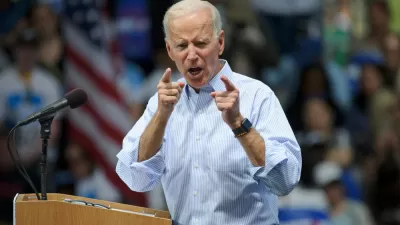Economics 101: It's difficult to reduce an activity if there's no price attached to it, so why are many environmentalists increasingly turning away from wanting to price carbon emissions?

"This month's fuel-tax riots in Paris and the defeat of a carbon-fee ballot measure in Washington state show the difficulty of getting people to support a levy on the energy sources that heat their homes and power their cars," report Zack Colman and Eric Wolff for POLITICO.
The story of the carbon tax’s fading appeal, even among groups that like it in principle, shows the difficulties of crafting a politically palatable solution to one of the world’s most urgent problems — including greenhouse gas levels that are on track to reach a record high this year.
"If it can't pass in Washington state right now, I'm not sure that says that there's much of a pathway at this moment nationally," said Sen. Jeff Merkley (D-Ore.).
California is the only state government that prices carbon emissions, using a cap-and-trade program created by the Global Warming Solutions Act of 2006, which was renewed two years ago, setting a goal to reduce emissions 40 percent below 1990 levels by 2030. Last year the state passed separate legislation to continue the cap-and-trade program through 2030.
Meanwhile, even the most liberal Democratic candidates this year gave carbon taxes scant if any mention in their climate platforms, focusing instead on proposals like a phaseout of fossil fuels and massive investments in wind and solar power.
For example, Rep.-elect Alexandria Ocasio-Cortez (D-N.Y), who supports a carbon tax, is "promoting it as just one possible element of a sweeping 'Green New Deal' that includes pouring huge amounts of money into renewable energy," note Colman and Wolff.
Could the explanation be as simple as an aversion to new taxes, particularly after the Republicans' landmark tax-cutting package?
"You do have this irony, and that is the policy that is overwhelmingly endorsed by economists of the right, the center and the left as the best way to reduce greenhouse gas emissions is inverse with what is politically feasible," said Barry Rabe, director of the Center for Local, State, and Urban Policy at the Gerald Ford School of Public Policy at the University of Michigan, who has studied carbon taxes.
Adding to the irony is that the public believes climate change is real, notwithstanding President Trump's rejection of climate science that is echoed by much of the GOP. Rabe points to a University of Michigan survey last month that found that 73 percent of Americans believe there is solid evidence of global warming.
Colman and Wolff delve into many aspects of carbon taxes—countries that have adopted and rejected them, and different types. A bipartisan congressional bill that has received much recent attention, H.R.7173 - Energy Innovation and Carbon Dividend Act of 2018, sponsored by Reps. Ted Deutch (D-Fla.) and Brian Fitzpatrick (R-Pa.), was unveiled on Nov. 27.
According to Deutch, the bill will price "carbon at $15 per metric ton of CO2e and increasing the price by $10 every year. The Treasury Department would return 100% of the net revenue back to the American people, a policy highlighted by a Treasury Department report as helping lower- and middle-income families." See one-page fact sheet [pdf].
Hat tip to Mark Boshnack.
FULL STORY: Why greens are turning away from a carbon tax

Alabama: Trump Terminates Settlements for Black Communities Harmed By Raw Sewage
Trump deemed the landmark civil rights agreement “illegal DEI and environmental justice policy.”

Planetizen Federal Action Tracker
A weekly monitor of how Trump’s orders and actions are impacting planners and planning in America.

How Atlanta Built 7,000 Housing Units in 3 Years
The city’s comprehensive, neighborhood-focused housing strategy focuses on identifying properties and land that can be repurposed for housing and encouraging development in underserved neighborhoods.

In Both Crashes and Crime, Public Transportation is Far Safer than Driving
Contrary to popular assumptions, public transportation has far lower crash and crime rates than automobile travel. For safer communities, improve and encourage transit travel.

Report: Zoning Reforms Should Complement Nashville’s Ambitious Transit Plan
Without reform, restrictive zoning codes will limit the impact of the city’s planned transit expansion and could exclude some of the residents who depend on transit the most.

Judge Orders Release of Frozen IRA, IIJA Funding
The decision is a victory for environmental groups who charged that freezing funds for critical infrastructure and disaster response programs caused “real and irreparable harm” to communities.
Urban Design for Planners 1: Software Tools
This six-course series explores essential urban design concepts using open source software and equips planners with the tools they need to participate fully in the urban design process.
Planning for Universal Design
Learn the tools for implementing Universal Design in planning regulations.
Jessamine County Fiscal Court
Caltrans
Institute for Housing and Urban Development Studies (IHS)
City of Grandview
Harvard GSD Executive Education
Toledo-Lucas County Plan Commissions
Salt Lake City
NYU Wagner Graduate School of Public Service





























